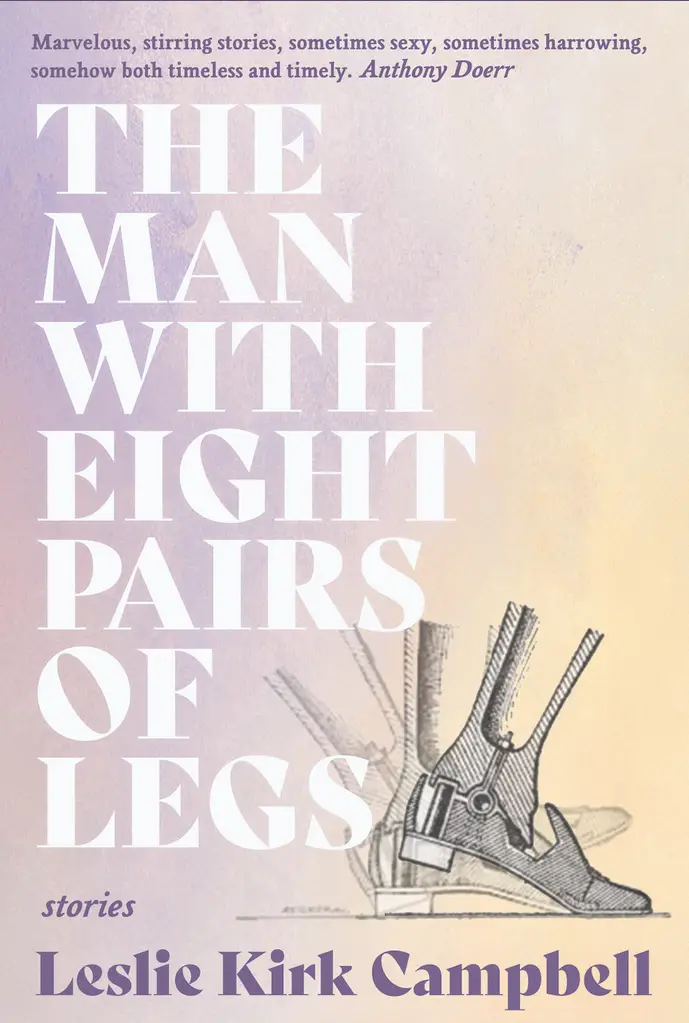Among the terrific releases from indie publishers this month is Leslie Kirk Campbell’s debut story collection, The Man with Eight Pairs of Legs. This collection of richly imagined stories was awarded the Mary McCarthy Prize in Short Fiction from Sarabande Books in 2020, and is Campbell’s fiction debut.
In the title story, Harriet Rogers, a too-tall, rawboned high school teacher who’s lived with body shame most of her life, falls for Callahan, a local mineworker she meets one night in the local bar, and whose prosthetic legs she discovers later that night when they climb into bed. Set in Cañon City, a small town at the foot of the Sawatch Range in central Colorado, the story mines the intersection of able-bodiedness and disability and intolerance of the other. The couple, both outsiders, are a flashpoint in the town, but they keep to themselves as Callahan’s resolute attitude about his body bumps up against Harriet’s inward, complicated one:
“He called them his phantoms, which made perfect sense. She’d searched, but had repeatedly failed to find the locus of her own indelible suffering, an ache that seemed to reach far beyond the bitterness still lingering from a childhood of mockery. And yet, if she paid attention to it, the pain seem to spread everywhere, like miniature firing squads beneath her clothes.”
Callahan is the victim of a local mine explosion, and as his relationship with Harriet grows, he unveils numerous pairs of prosthetic legs—the eight pairs of the book’s title. Harriet is slightly jealous, seeing in his engineered limbs an ideal an able-bodied person could never possess. Callahan, as it turns out, wants to run in the Human Race, a yearly marathon in Cañon City, its first-ever competitor with prosthetic limbs. The tensions that surface as Callahan trains force the couple to reconcile their individual histories with the future they might have together.
“Thunder in Illinois” centers on the weekly word game of a long-married Midwestern couple, Mr. and Mrs. Evans, but in reality, the game is a backdrop for the struggle of the husband’s longtime infidelity and the terminal illness he’s battling. That premise might sound bleak, but the story’s stylish, wry voice, and banter between the couple reveal a rich vein of friction. As the game unfolds, we’re shown the attachment, and the complexity, of a long marriage:
He can’t remember when she first said he was the cause of her loneliness. He holds tight to the blame. He doesn’t mean to, but at night when he and Mrs. Evans turn on the fan and lie back against the coolness of the sheet on separate sides of their king-sized bed, he often feels it in his blood and smells its rotten scent.
Mr. Evans knows he must give up his affair with Vilai, the Thai woman he’s been supporting in Bangkok (met on one of his frequent business trips to Asia), and reconcile his life with Mrs. Evans, a woman who is not altogether easy—but characters who are easy and lives that are smooth are not Campbell’s territory. There’s a wisdom in this story, one that centers on the links between free will and consequence, a wisdom Mrs. Evans has and one for Mr. Evans to discover: “‘The flap of a moth in Bangkok,’ says Mrs. Evans. ‘Makes for thunder in Illinois,’ says Mr. Evans.”
In “Overture,” a woman victimized by domestic violence, Margie, is confined to her house by a controlling husband, and with two school-age children to raise, lives a half-life in her suburban tract. Her youthful self, a young woman of opinions and an ambition “to sing bel canto like Maria Callas,” is reduced to a small memory inside her, but one that still animates and sustains: “…all the arias I haven’t sung are fire in my throat.” Margie is a fragile figure, nearly broken, and from an often-harrowing first-person point of view, Campbell shows us Margie’s degradation, silence, and sense of invisibility. When Mark, the husband, makes a rare allowance for the family to attend a school event, Margie realizes there’s no one who’ll even think to ask her “…why are you wearing sunglasses inside?”
The collection’s closing story, “Triptych,” a beautiful piece set in 1984, centers on loss and illness. Llyn, an artist and pregnant single mother, lives in a San Francisco apartment next door to Grady Delacroix, a gay man dying of AIDS. Told from multiple points of view—Llyn’s, Grady’s, and Llyn’s boy, Cash—covers six years, the span of Grady’s illness and death, and Cash’s birth and early childhood. It’s a stunning portrait of how three lives, and three forms of need, define a found family.
Leslie Kirk Campbell is also the author of Journey into Motherhood: Writing Your Way to Self-Discovery (Riverhead), and numerous personal and political essays. Her award-winning short fiction has appeared in such journals as Ploughshares, Southern Indiana Review, Briarcliff Review, and Arts and Letters. She is an instructor of creative writing in San Francisco.
Read the full Litstack review here.
—Lauren Alwan



